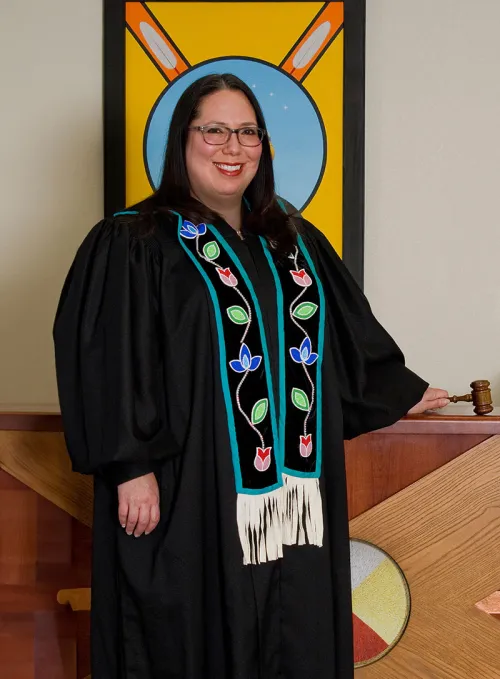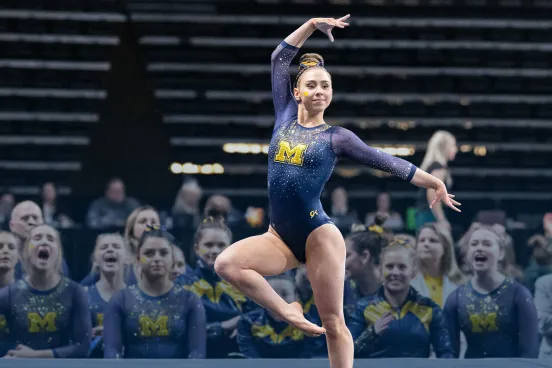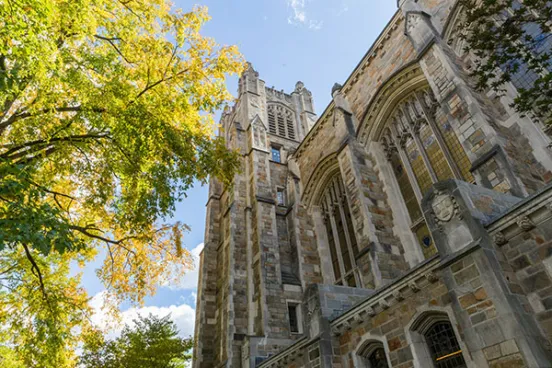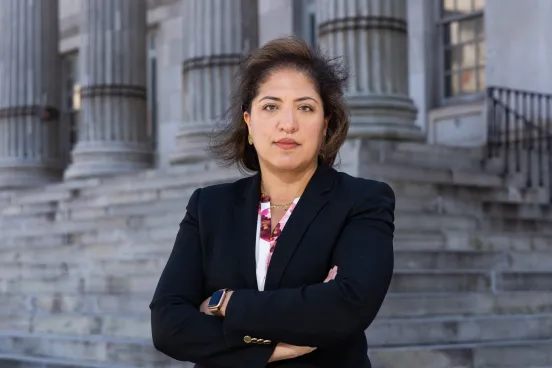
When Allie Greenleaf Maldonado, ’00, first donned the robes of a judge on the Michigan Court of Appeals at her January swearing in, she also donned two mementos that held special meaning: an eagle feather and a beaded seal from the Little Traverse Bay Bands of Odawa Indians.
The mementos were emblematic of her service as assistant general counsel to the tribe and as chief judge on its tribal court.
Her swearing in was a first for the court as well; before Gov. Gretchen Whitmer made the appointment, a tribal citizen had never sat on the Michigan Court of Appeals. While any judge, regardless of background, would feel an immense sense of responsibility serving on the court, Maldonado feels an even greater need to represent Native people.
Allie Greenleaf Maldonado, ’00“I feel like I had better do better than my best, and I intend to do that. I have a ton to learn, so I've rolled up my sleeves and started digging into the work. I'm excited.”
Impact on Indian child welfare
Maldonado’s professional background serves her well in her new position.
As assistant general counsel, she handled a variety of legal issues, from regulatory and employment law for the tribe’s casino to litigation and governmental work. And as a judge, she heard traffic cases; election cases; divorce, probate, and custody cases; and everything in between.
“It was a really good fit for me,” she says. “I like a diversity of work, and I like learning new things.”
Notable among her accomplishments were changes she helped make in the state’s legal system relating to Indian child welfare. As the tribe’s assistant general counsel, she realized that the State of Michigan repeatedly violated the Indian Child Welfare Act (ICWA), which established federal standards for the removal of American Indian children from their families in custody, foster care, and adoption cases.
Those cases hit particularly close to home: Members of her own family were part of the federal government’s policy of removing Indian children from their families in order to assimilate them. Her grandmother, for example, was placed in two different boarding schools in northern Michigan.
While Maldonado had success suing the state, she decided to go a step further: She and other tribal members worked with the state’s Department of Human Services (DHS) to bring its rules and procedures into compliance with the ICWA. The experience proved to be a turning point for Maldonado.
“I had been litigating in this very adversarial position,” she says. “But then I sat down at a table with people, and we did something that made a difference for Michigan's children and families.”
In 2009, the State Court Administrative Office launched a project to write a benchbook for judges to help them follow the ICWA. Maldonado contributed to that and served on a subcommittee that rewrote the court rule for the Michigan Supreme Court as well as dozens of court forms.
All of this led to her work on the Michigan Indian Family Preservation Act (MIFPA). Seeing that other states had their own Indian child welfare laws, a group of tribal representatives as well as attorneys, DHS staff, law professors, and probate judges came together to draft a law for Michigan.
“I had the honor of writing the very first draft,” says Maldonado. “And others came to the table and elevated my work.” She cites standing behind then-Gov. Rick Snyder, ’81, as he signed MIFPA into law in 2012 as one of the proudest moments of her life.
As she looks to the future and her new position, she keeps in mind these lessons that shaped her past and the special perspective she brings to the court.
“There aren’t a lot of people on the Court of Appeals who are from Up North,” says Maldonado, who hails from Petoskey. “I think that the viewpoint of northern Michigan is a unique one—our values and our connection to the land and, especially, our connection to the water.”





